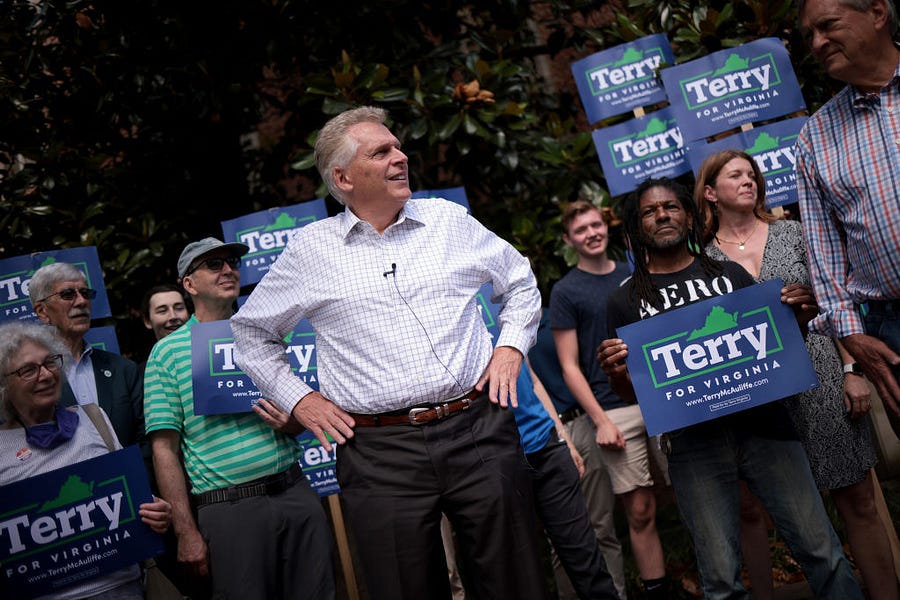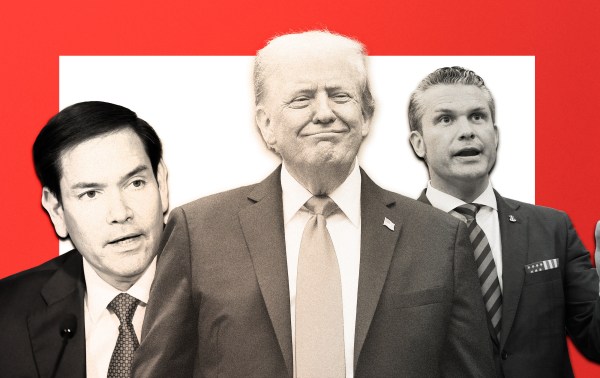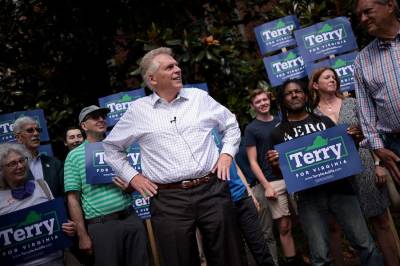In Case You’re Hungry: This is a great explainer of ranked choice voting, using … breakfast. As the geniuses at the Wall Street Journal put it, “We created a sample ranked-choice election based on the New York City primary ballot. But instead of choosing between mayoral candidates, we are asking you to rank your favorite bagel orders.” Enjoy!
A Surprise GOP Win on the Border: Republicans may not have much hope in the New York City Mayor’s race this year, but two surprise mayoral elections in Texas may be worth some attention from both sides of the aisle. At the southern tip of Texas sits McAllen. It has a population of only 140,000—small but mighty—and is 85 percent Hispanic. The county voted for Biden by 17 percentage points in 2020 and Hillary Clinton by 40 points in 2016. This weekend, former chair of the local Republican Party and city commissioner Javier Villalobos won the runoff election for mayor. Democrats have controlled the city since at least 1997 by my count, so this is a big deal. Republicans are quick to point to Democrats’ continued slide with Hispanic voters even post-Trump as evidence for their “America First” agenda and the unfolding border crisis as a sign of trouble for Democrats in 2022. The GOP also held onto the mayor’s seat in Fort Worth. After Biden won the county last fall—the first time a Democratic presidential candidate has won it in decades—Democrats yet again thought this might be the tide that turned Texas blue.
On the one hand, this is clearly bad news for Texas Democrats. They had two open seats in places Biden won. They lost both. Hard to spin that. But does it prove that Republicans are on the precipice of a landslide election in the midterms and Hispanic voters have turned on the Democratic Party for good and that the border is more of a political disaster than anyone appreciates? Probably not. Villalobos won in McAllen by 206 votes out of 9,282 cast. Republicans may win big in 2022, but I’m not willing to place a lot of forecasting weight on 9,000 people who turned out for a Saturday mayor’s runoff race just yet.
And There’s The Rub: This piece from the Wall Street Journal was about the best summary of 2020 and what I’ve been trying to say about the GOP electorate shift to date.
In Pennsylvania, for example, more than 600,000 voters who cast ballots in 2020 had been eligible to vote in prior general elections but never did, TargetSmart found. More of these newly engaged voters registered as Republicans than Democrats by about 6 percentage points, giving the GOP an edge of about 35,400 voters in a fiercely competitive state—though one which Mr. Biden won…
But the strategy came with a gamble. In engaging more working-class and rural Americans, Mr. Trump forfeited a measure of support from professional-class and suburban voters in the process, losing people who show up regularly for elections in favor of those with inconsistent voting records. That has left Republicans with an increased reliance on voters who likely need an extra push to turn out again, analysts in both parties say.
So now the question is, will those low-propensity voters that the GOP has built its new house upon show up to vote in a midterm election when Trump isn’t on the ballot? Actually, I wouldn’t rule it out. That’s what all this culture war stuff is about, and my bet right now is that it’s damn effective.
Fun with Data: Enjoy getting sucked into the fascinating and contradictory vortex of this visual chart of donor data showing which candidates shared donors in 2020. I put in Susan Collins and found that 17 percent of Collins’ donors also gave to Jim Jordan (what?!?) and 16.5 percent of Devin Nunes donors gave to Susan Collins. Just proving small-dollar donors are not easy to pigeonhole by issue or temperament or anything else!
The L Word: According to a new Forbes story, “Many progressives have described themselves as pleasantly surprised by Biden’s liberal agenda … new polls suggest the general public has been surprised, too, but in a less positive way.”
“Relative to your expectations when he was elected, would you say Joe Biden has been more or less liberal as president than you expected?” In response, 42% said he had been more liberal than expected and 8% less so. Not surprisingly, 60% of Republicans said he had been more liberal than they expected. A surprising 35% of Democrats gave this response.
A few days later, Fox News released a poll, also of registered voters, that tapped into a similar sentiment. The bipartisan polling team that conducts the Fox polls found that 46% of registered voters thought the president was too liberal, up ten points from their December 2019 poll.”
On the one hand, you can read this as bad news for Democrat’s 2022 prospects of holding onto the House if Republicans can so easily tap into the “they’re just too liberal” sentiment. But in a midterm election in which partisans are the easiest to turn out, Democrats may actually be picking up enough enthusiasm with the “pleasantly surprised” liberals in their base to offset their losses with independents who are more likely to sit this one out anyway.
Chris is back with the pop, crackle, fizzle...
Virginia’s Primary Fizzle
It’s Election Day in Virginia, at least if you’re a Democrat. Republicans have some unfinished business for a handful of seats in the state legislature, and there are plenty of local races to be considered in the commonwealth’s off-off-year election, but the red team is pretty much on the sidelines for this one.
The Virginia GOP opted for a Rube Goldberg convention/election/ranked-choice contest instead of a primary for governor. The process produced a surprise victory for the unusually normal-seeming and abnormally rich businessman Glenn Youngkin out of a crowded field otherwise dominated by Donald Trump impersonators.
Democrats have to pick a whole slate of candidates from governor and legislative candidates down to municipal officials, but I can’t help but wonder how many of Virginia’s nearly 6 million registered voters will actually be taking part in this particular pageant of democracy. My guess is probably only about one in 20.
Virginia saw a relatively big turnout for its last gubernatorial primary in 2017. It had sharp ideological divisions on both sides, with secession-admiring Republican Corey Stewart trying to stop former RNC Chairman Ed Gillespie and progressive former Congressman Tom Perriello trying to do the same to then-state Sen. Ralph Northam. The contests that nominated Gillespie and Northam produced huge media coverage, enormous spending and unusually high primary turnout. More than 900,000 Virginians voted, nearly 17 percent of the electorate.
Obligingly, neither party inflicted a primary on Virginia voters in 2013. Former DNC Chairman Terry McAuliffe and Republican Ken Cuccinelli, then the state attorney general, won their respective party nominations by default. McAuliffe had used his mega-donor fundraising to clear the Democratic field and Cuccinelli had done the same by his lock on socially conservative voters.
The 2009 contest in Virginia was more typical of the tedious affairs that tend to predominate in state-level primaries. It asked this crucial question: Which boring politician of substantially similar positions will get the chance to try to pander in a different direction for the general election? While Republicans didn’t have a race at all because then-Attorney General Bob McDonnell was unopposed, Democrats had to slog through a contest between McAuliffe, Brian Moran, the brother of then-Rep. Jim Moran, and state Sen. Creigh Deeds. It was a tedious contest that produced a predictable victory for Deeds. Fewer than 320,000 Virginians bothered to participate, 6.4 percent of registered voters.
But this year’s Democratic-only contest can’t even produce the same sizzle as the 2009 fizzle. McAuliffe is running for a second non-consecutive term and is heavily favored to win against a crowded field, including three African-American candidates who will probably divide that key bloc of Democratic voters. Don’t be surprised if McAuliffe even ends up winning among Black Democrats. With Republicans stumbling into nominating their most viable choice in Youngkin, McAuliffe’s Biden-like electability argument could go a long way.
It’s safe to say that Republican chances in Virginia are long, and will depend substantially on how popular President Biden is come November. Youngkin certainly keeps the GOP in the game and McAuliffe has his weaknesses. But that’s not why I want to talk about this election today. What I want to know is why the residents of Virginia should be expected to endure and subsidize the Democrats’ effort to select a nominee for everything from governor down to county commissioners and small-town mayors.
There are lots of reasons America’s 50-year experiment with state-run primary elections has been a terrible mistake, mostly related to zombie partisanship and perverse incentives for bad governance. But save a thought for taxpayers and citizens who have to endure the races and foot the bills, too. It’s hard to come by hard numbers in most states for the cost of primary elections, but just as a point of reference, North Dakota, which makes a scrupulous accounting of election costs, spent $9.88 per vote cast in its 2018 primary elections.
There’s no reason Virginia Democrats should expect taxpayers to subsidize their nominating process and mobilize the whole electoral apparatus for what will probably be about 5 percent of the electorate. It’s worse in a state with a late primary and odd-year elections, but the principle applies in every state with partisan primaries: Just leave the rest of us out of it.








Please note that we at The Dispatch hold ourselves, our work, and our commenters to a higher standard than other places on the internet. We welcome comments that foster genuine debate or discussion—including comments critical of us or our work—but responses that include ad hominem attacks on fellow Dispatch members or are intended to stoke fear and anger may be moderated.
With your membership, you only have the ability to comment on The Morning Dispatch articles. Consider upgrading to join the conversation everywhere.